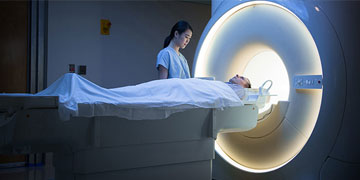
Radiology is a medical specialty that uses various imaging techniques to diagnose and treat diseases within the human body. It encompasses a wide range of imaging modalities and sub-specialties. Below are the details of the subjects and topics covered in radiology:
Basic Sciences:
1. Anatomy:
- Gross anatomy of the human body
- Radiological anatomy relevant to imaging modalities
2. Physiology:
- Normal physiological processes and functions of the human body
- Pathophysiological changes relevant to imaging findings
3. Pathology:
- General pathology
- Radiological-pathological correlation
4. Pharmacology:
- Contrast agents used in imaging
- Radiation safety and protection
Imaging Modalities:
1. Radiography (X-ray):
- Principles of X-ray production and interaction with tissues
- Radiographic positioning and techniques
- Interpretation of chest X-rays, skeletal X-rays, and abdominal X-rays
2. Computed Tomography (CT):
- Principles of CT scanning
- CT anatomy and pathology
- Advanced CT techniques (e.g., CT angiography, CT colonography)
3. Magnetic Resonance Imaging (MRI):
- Principles of MRI
- MRI anatomy and pathology
- Advanced MRI techniques (e.g., MR angiography, functional MRI)
4. Ultrasound:
- Principles of ultrasound imaging
- Ultrasound anatomy and pathology
- Doppler and color flow imaging
5. Nuclear Medicine:
- Principles of nuclear medicine imaging
- Radiopharmaceuticals and tracer kinetics
- Single-photon emission computed tomography (SPECT) and positron emission tomography (PET)
6. Interventional Radiology:
- Principles of interventional radiology procedures
- Vascular and non-vascular interventions
- Image-guided biopsy and drainage procedures
Sub-Specialties:
1. Neuroradiology:
- Imaging of the brain, spine, and head and neck
- Neurological diseases and conditions
2. Musculoskeletal Radiology:
- Imaging of bones, joints, and soft tissues
- Orthopedic and rheumatological conditions
3. Abdominal Radiology:
- Imaging of the gastrointestinal tract, liver, pancreas, and genitourinary system
- Abdominal and pelvic diseases and conditions
4. Thoracic Radiology:
- Imaging of the chest and cardiovascular system
- Pulmonary and cardiac diseases and conditions
5. Breast Imaging:
- Mammography, ultrasound, and MRI of the breast
- Breast cancer screening and diagnosis
6. Pediatric Radiology:
- Imaging of pediatric diseases and conditions
- Radiation safety in pediatric imaging
Advanced Topics:
1. Radiation Physics:
- Principles of radiation physics
- Radiation dose and safety
2. Radiation Biology:
- Biological effects of radiation
- Radiation protection and safety measures
3. Radiation Oncology:
- Role of radiology in cancer diagnosis and treatment
- Radiation therapy planning and techniques
Skills and Procedures:
1. Image Interpretation:
- Systematic approach to image interpretation
- Recognition of normal and abnormal findings
2. Image-guided Procedures:
- Ultrasound-guided biopsies and aspirations
- CT and fluoroscopy-guided interventions
3. Contrast Media Administration:
- Intravenous and oral contrast agents
- Allergic reactions and side effects
Research and Ethics:
1. Research Methodology:
- Principles of research design and statistics
- Research ethics and patient confidentiality
2. Ethics and Professionalism:
- Medical ethics and patient care
- Professional conduct and communication skills
Conclusion:
Radiology is a multifaceted specialty that requires comprehensive knowledge of anatomy, physiology, pathology, and imaging modalities. Radiologists must be skilled in interpreting various imaging studies accurately and providing clinical guidance based on their findings. Continuous learning and staying updated with the latest advancements in radiology are essential for maintaining excellence in this dynamic field.
